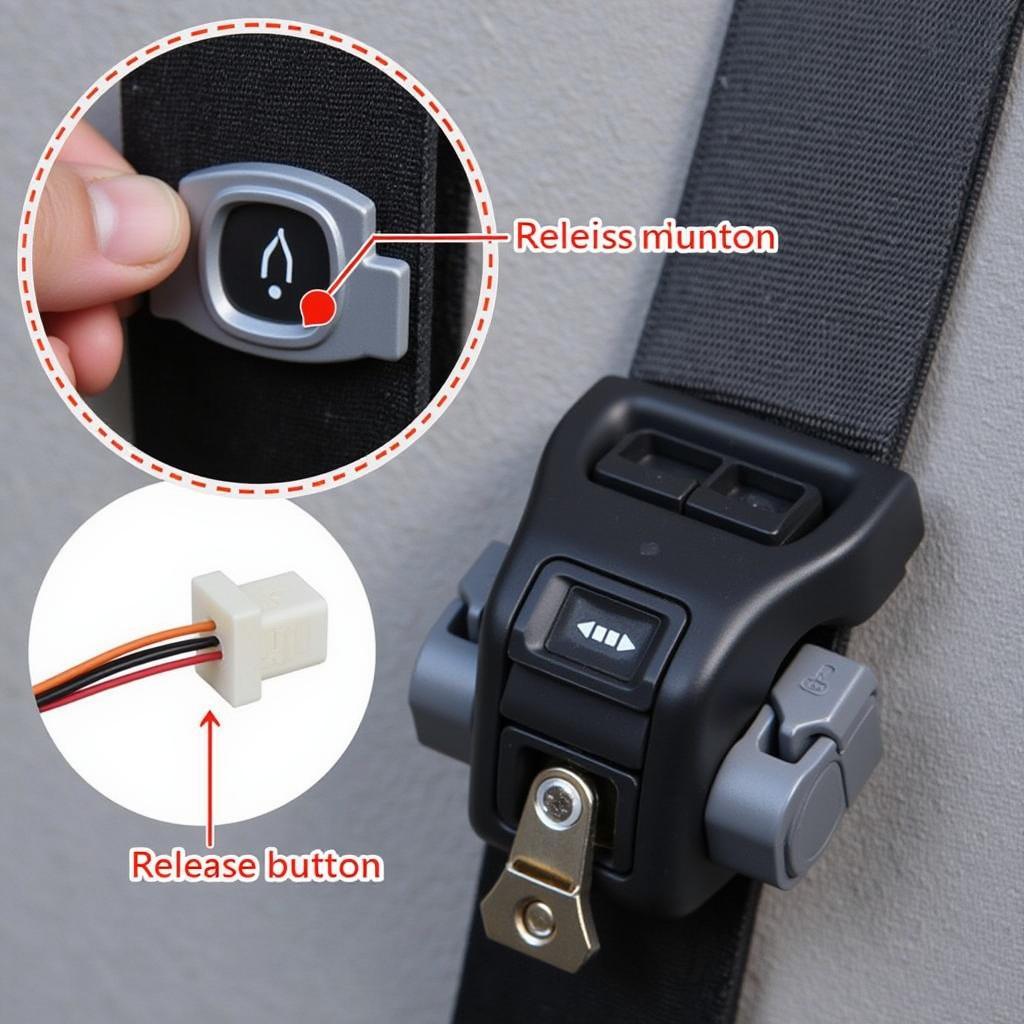Experiencing a parking brake warning light on your E70, especially when turning, can be a frustrating experience. This issue often points to a problem within the electromechanical parking brake system, a common feature in BMW models. While it might seem alarming, understanding the potential causes and solutions can help you address the issue effectively.
This comprehensive guide will delve into the reasons behind the E70 parking brake warning light illuminating when turning. We’ll explore common culprits, diagnostic procedures, and potential solutions, empowering you to tackle this problem head-on.
Decoding the E70 Parking Brake System
Before diving into troubleshooting, it’s crucial to grasp the basics of how the E70 parking brake system operates. Unlike traditional handbrake systems, the E70 utilizes an electronic parking brake controlled by an actuator motor mounted on each rear caliper. This system is activated by a switch on the center console, engaging the motor to apply the brakes. When disengaged, the motor releases the brake calipers.
Common Causes of the E70 Parking Brake Warning Light When Turning
The parking brake warning light illuminating when turning is often a symptom of a deeper issue within the system. Here are some of the most common culprits:
1. Faulty Steering Angle Sensor
The steering angle sensor plays a vital role in various vehicle functions, including the Dynamic Stability Control (DSC) system. If this sensor malfunctions and sends incorrect data to the vehicle’s control units, it can trigger the parking brake warning light, especially during turns when the steering wheel is rotated.
2. Worn-Out Brake Pad Wear Sensors
The E70 is equipped with brake pad wear sensors that monitor the thickness of your brake pads. As your brake pads wear down, these sensors eventually trigger a warning light on your dashboard. However, if the sensors are faulty or worn out, they can send false signals, causing the parking brake warning light to illuminate even when your brake pads are in good condition.
3. Malfunctioning Wheel Speed Sensors
Wheel speed sensors, an integral part of the ABS and DSC systems, constantly monitor the rotational speed of each wheel. A faulty wheel speed sensor can disrupt these systems and potentially trigger the parking brake warning light when the vehicle senses inconsistencies in wheel speed, particularly while turning.
4. Issues with the Electronic Parking Brake Module
The electronic parking brake module acts as the brain of the parking brake system. This module receives signals from various sensors, including the steering angle sensor and wheel speed sensors, and controls the actuator motors. A malfunctioning module can misinterpret signals or fail to command the actuator motors correctly, leading to the illumination of the parking brake warning light.
Troubleshooting the E70 Parking Brake Warning Light
Diagnosing the root cause of the parking brake warning light requires a systematic approach and often involves using a BMW-specific diagnostic scanner to read fault codes stored in the vehicle’s control units. Here’s a step-by-step guide:
- Read Fault Codes: Connect a compatible diagnostic scanner to your E70’s OBD-II port. Read any stored fault codes related to the parking brake system, steering angle sensor, wheel speed sensors, or DSC system.
- Analyze Fault Codes: Research the specific fault codes retrieved to understand their meaning and potential causes. This information will guide your further diagnosis.
- Inspect the Parking Brake System: Visually inspect the parking brake switch, wiring harness, and actuator motors for any signs of damage, corrosion, or loose connections.
- Check Brake Fluid Level: Ensure the brake fluid level in the reservoir is within the recommended range. Low brake fluid level can also trigger warning lights.
- Test Sensors: If the fault codes point to a specific sensor, such as the steering angle sensor or a wheel speed sensor, test the suspected sensor for proper operation using a multimeter or specialized tools.
- Verify Module Functionality: Test the electronic parking brake module for correct functionality using the diagnostic scanner. This might involve actuating the parking brake, monitoring live data streams, or performing specific module tests.
“Remember, working with automotive electrical systems requires caution. If you are not comfortable performing these diagnostic steps, it is always recommended to consult a qualified BMW technician.” – David Miller, ASE Certified Master Technician
Potential Solutions for the E70 Parking Brake Warning Light When Turning
Once you’ve pinpointed the underlying issue, the next step is to implement the appropriate solution:
- Sensor Replacement: If a faulty sensor is identified, replacing the sensor with a new, OEM-quality part is crucial. After replacement, ensure the sensor is properly calibrated to the vehicle.
- Module Repair or Replacement: In cases where the electronic parking brake module is malfunctioning, repairing or replacing the module is often necessary. Module repair might involve reprogramming or replacing faulty components within the module.
- Software Update: Sometimes, a software update for the vehicle’s control units, particularly those related to the parking brake, DSC, or steering systems, might resolve software-related glitches that trigger the warning light.
- Wiring Repair: Damaged or corroded wiring within the parking brake system should be repaired or replaced to ensure proper signal transmission.
Conclusion: Resolving the E70 Parking Brake Warning Light
The E70 parking brake warning light illuminating when turning, though potentially concerning, can be resolved with proper diagnosis and repair. By understanding the complexities of the electronic parking brake system and employing a systematic troubleshooting approach, you can effectively address the issue and restore your BMW E70 to optimal driving condition. If you’re ever in doubt, seeking the expertise of a qualified BMW technician can save you time, effort, and potential headaches down the line.

